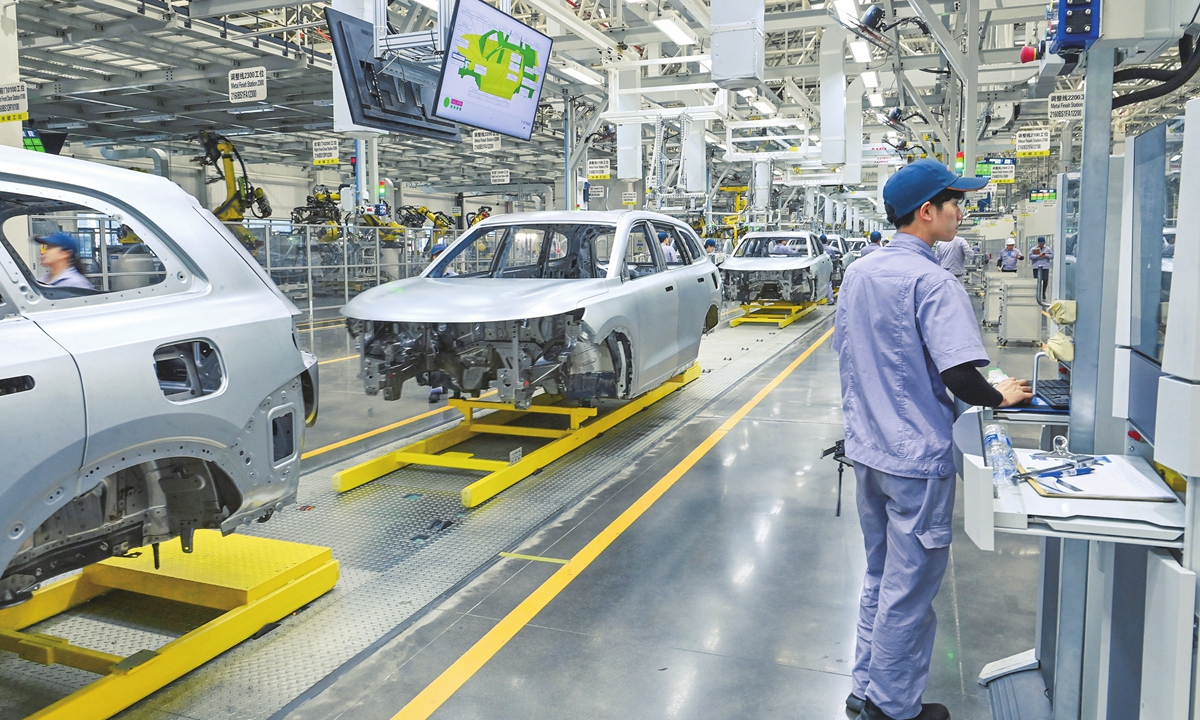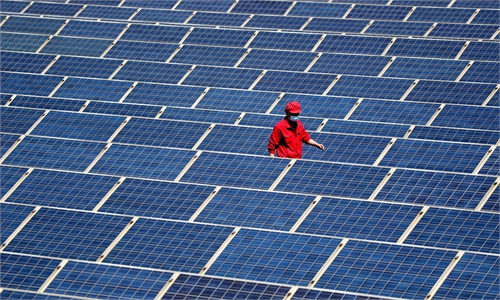G7 slammed for baseless claims against China

The manufacturing line of a NEV factory in Southwest China's Chongqing Municipality Photo: VCG
Chinese experts on Sunday slammed allegations of "non-market policies and practices" made by the Group of Seven (G7) finance chiefs in a joint communique, saying the baseless claims reflect the toxic influence of Washington's worsening protectionism among its allies and pose a serious threat to global free trade and supply chains.
While the joint communique issued after a meeting in Italy did not contain specific actions or concrete plans for actions, it still fully demonstrated that advanced economies are more interested in stirring up tension rather than promoting peace and cooperation, experts noted. If the so-called US allies blindly follow Washington's path of protectionism and conflict, their economies and consumers will face major losses, they said.
The joint communique released on Saturday following the meeting of G7 finance ministers and central bankers in Italy stated that "while reaffirming our interest in a balanced and reciprocal collaboration, we express concerns about China's comprehensive use of non-market policies and practices that undermines our workers, industries, and economic resilience."
The G7 finance ministers and central bankers further said they will "continue to monitor the potential negative impacts of overcapacity and will consider taking steps to ensure a level playing field."
"Overcapacity" has become a new euphemism in Washington's increasingly reckless crackdown campaign against advanced industries in China. Just days earlier the current US administration cited the accusation as the reason to hike tariffs on an array of Chinese products, including electric vehicles (EVs). Moreover, the US started a public pressure campaign to force its allies to back its campaign.
The adoption of typical US talking points in the G7 finance chiefs' joint communique underscored the toxic influence of Washington's protectionist policies on its allies, which choose politics over market principles and economic law, Chinese experts said.
"G7 politicians are following the US out of political considerations. And there is only one way for them to be able to achieve this: political coercion against the economy and capital," Li Yong, a senior research fellow at the China Association of International Trade, told the Global Times on Sunday.
Li further explained that following the US' protectionist path means politicians in these US allies must impose restrictions on businesses and investments. "If they follow the US' suit, their businesses will be restricted from free trade and their consumers will pay the price for low cost-effective products," he said.
Indeed, even though the G7 joint communique included talking points from US officials, it notably did not contain any specific actions that they would take jointly against China. There are also major differences among G7 officials on policies toward China, with some European officials clearly concerned about a potential trade war against China.
"Trade wars are all about losing, you can't win them," Germany's Finance Minister Christian Lindner told reporters, according to Reuters. Meanwhile, French Finance Minister Bruno Le Maire also said it was important to avoid a trade war with China, which remains "our economic partner," even though the minister also repeated claims of "unfair trade practices," Reuters reported. The UK's Chancellor of the Exchequer Jeremy Hunt also said his country won't rush to impose measures, according to Bloomberg.
Major risk
Still, given the US' relentless campaign to pressure its allies to join its containment of China and ideological bias toward China's rapid development in some quarters of the Western world, some US allies might actually follow Washington's steps in taking protectionist moves against China, Chinese experts cautioned.
"Some members of the G7 may follow the US' approach because China's technological development and industrial chain development are very fast. In some situations, China has taken a completely different lane and surpassed other countries, and it even reached a degree where the US cannot compete," said Chen Fengying, an economist and former director of the Institute of World Economic Studies at the China Institutes of Contemporary International Relations.
Chen told the Global Times on Sunday that some US allies also want to contain China's rise, and the US offered the cover for them to do so with Washington's protectionist moves against China. However, their approach is to impose restrictions on Chinese products, so as to buy time for their own domestic industries, which not only will fail to contain China but also undermine their own domestic industries.
"Their development of new technologies is lagging behind China and has even stagnated, so they want to protect existing technologies. But innovation is where China's power lies," Chen said.
Moreover, such protectionist moves pose a serious risk to global free trade and the world economy, as the actions could lead to further disruptions and create severe fragmentation in global trade. Trade fragmentation through friend-shoring - an approach pursued by some Western officials to trade primarily with countries sharing similar values - could lead to real GDP losses of up to 4.7 percent in some economies, according to an IMF report released in May 2023.
In light of protectionist moves from the US and the EU, which has launched a so-called anti-subsidy investigation into Chinese EVs that could lead to tariff hikes, Chinese officials have vowed to take all necessary measures to defend China's legitimate rights and interests.
Chinese analysts also said that when the US actually imposes the tariff hikes and if the EU would do the same, China will definitely take countermeasures, though the specific moves and their scopes remain to be seen.
"There is no doubt in my mind that China will take countermeasures," Gao Lingyun, an expert from the Chinese Academy of Social Sciences, told the Global Times in an interview on Thursday.
While China has not announced specific countermeasures, many Western media outlets have been focusing on suggestions made by Chinese experts and industries.
In an exclusive interview with the Global Times last week, a prominent Chinese auto industry expert said China should consider raising temporary tariffs on imported cars with engines larger than 2.5 liters. Also on Saturday, the Global Times learned exclusively from a business insider that relevant Chinese industries are preparing evidence, as they plan to apply to competent authorities to launch an anti-dumping investigation into imports of certain pork from the EU.


